34-YO Delhi Man Moves To Ooty, Coaches Tribal Kids To Run In the 2028 Olympics
Delhi’s Karan Singh has used his six years of experience in training with international coaches in the US to scout for local talent from tribal areas of Jharkhand. Through the Indian Track Foundation, he is training these children to become middle and long-distance runners and win medals for India in the 2028 LA Olympics, and beyond.
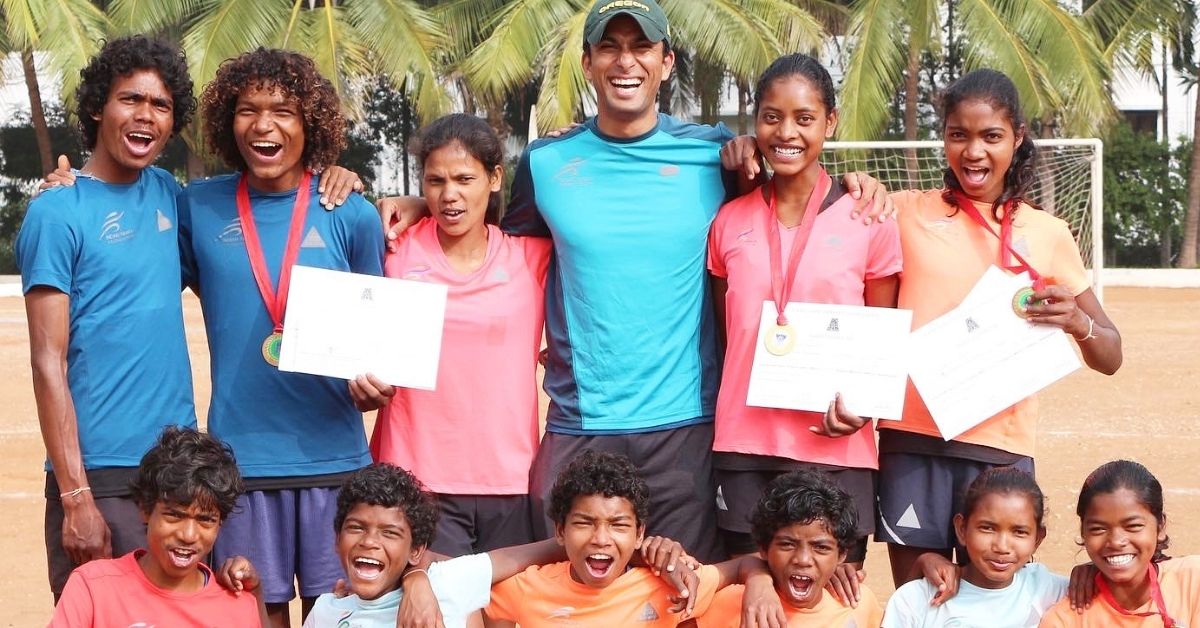
In August 2018, Karan Singh, a native of New Delhi, established the Indian Track Foundation in Ooty with one dream — to train kids to win medals for India in the 2028 LA Olympics, and beyond. For years, he himself nurtured the dream of representing his country in athletics, but a series of knee injuries and surgeries cut short his aspirations.
Undeterred, Karan has been using all the things he learned while spending six years in the US — one of the best places for middle and long-distance running in the world — for promoting promising talent in middle and long-distance running from the remotest tribal hamlets of Jharkhand.
While in Eugene, Karan learned that there were many differences in the way athletes were trained in India versus how they were in America. Simultaneously, he was part of the Indian National Camp in 2011. He would return to India and visit Bengaluru. This, he says, was cathartic. “I had this realisation that there are many athletes in our country who are much younger than me, and far more talented,” the 34-year-old tells The Better India, adding, “If I were to take them to the US and train them, they would have a much better shot than me in achieving things for the country.”
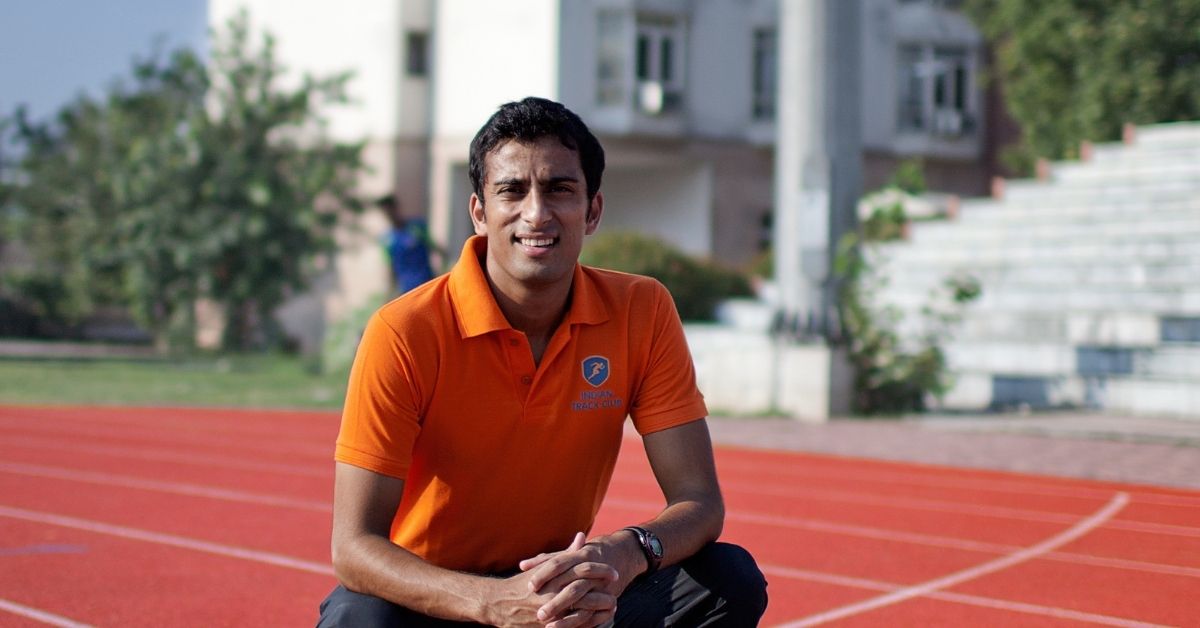
He says that at the National Camp, living with fellow athletes made him realise how differently athletes were coached in the US. “Everything is more structured there. The system is in place. Out here, athletes don’t really know what’s going on, it’s like they’re just running without a plan in place. They don’t have the facilities to realise their own potential, and there’s a lack of direction that’s provided to them,” Karan says, adding he was aware that flying athletes to the US won’t be the most feasible option.
An epiphany
In 2012, while he was at the Prefontaine Classic in Eugene, Karan saw Arjuna awardees Preeja Sreedharan and Kavita Raut, get overlapped on the track. “These were the best athletes in India, but they couldn’t compete with the best in the world. I felt terrible, because that’s not their fault. It’s the system. You can’t just say that the girls are not good enough — you have to dig deep into why it happens. They were just ferried to the US and left in an unknown environment. Someone needed to guide and direct them,” he recalls.
This was Karan’s epiphany. “Sometimes, you get a calling in life to make a change,” he says.
In 2013, he returned to India with a mission. Here, he started the Indian Track Club in Delhi in August the same year to train athletes in the city. The programme was built on what he had observed in the US. “I just wanted to get kids to run. Back then, there wasn’t much happening for Indian runners in terms of opportunities. There’s a difference between running in school and representing your country,” he says.
To change the current state of track and field running, Karan knew something special had to be done. “There was never a process in place like there is for, say, cricket. Today, if Virat Kohli retires, there will be another one ready to take his place. That’s how robust the system is for that sport. I wanted to do that for running,” he says.
‘A life in the mountains’
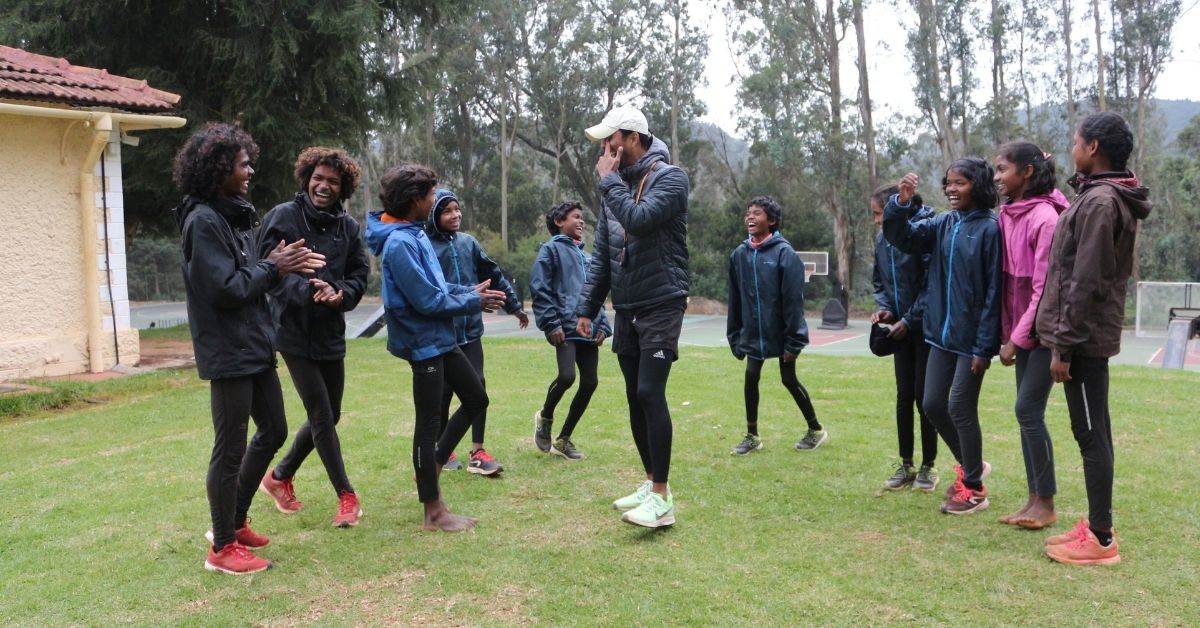
While he jumped into the venture head first, he was overwhelmed by the response. “Hundreds of kids wanted to be coached by me,” he recalls. “Kids from all walks of life came in. Some did really well at the state and national levels. But even then, I knew the Olympics was a far away dream. Of course, I was proud of what we were doing, but when it came to winning medals for India, we still had work to do.”
In 2015, Karan developed a scouting programme, specifically with the aim of bringing in kids from outside Delhi. For this, he zeroed in on five children from Chiraigaon, a small village outside Varanasi. He brought them to Delhi and covered all their expenses, and set them up in a house near his place in Gurgaon. But the plan didn’t work out in the long run.
Disheartened but not willing to give up, Karan reached out to one of his coaches in the US. “I explained my dream to him, told him I was aware of the immense talent in India, but had no idea how to utilise it to its fullest potential. He told me I needed to go and live in the mountains, and like a monk. He said I needed to take that plunge, and dedicate my entire life to it. I had to actually make it, not just reach the top,” he says.
This helped Karan realise he needed to step out of his comfort zone. Over the next two years, he slowly arrived at the decision to move to the hills. He also used this time to go on various scouting trips, and reach out to children who came from humble backgrounds and could be worked with in the long term. It took a lot of research and time commitment. Finally, Karan moved to Ooty with his wife in 2018.
“I wanted to reach out to kids in even the most remote parts of the country. In 2018, I set up the Indian Track Foundation (ITF), and reached out to a few kids from Daltonganj in Jharkhand. We zeroed in on five children,” he says.
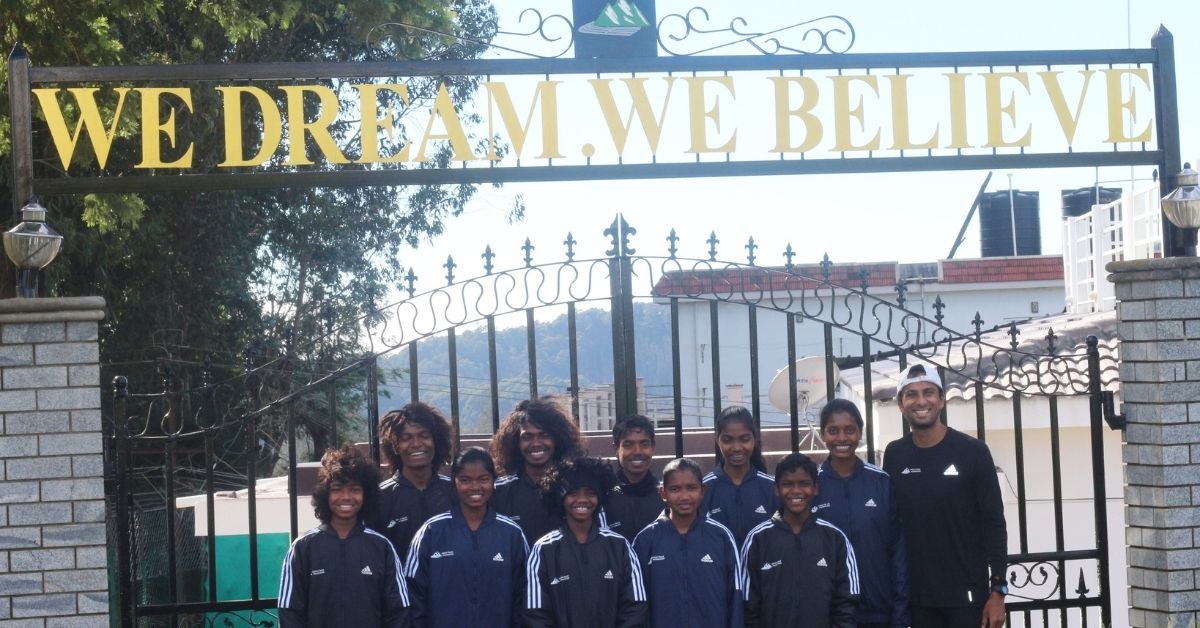
The athletes, aged between 10 and 16 years, were all put up in the same house. Karan and his wife took care of their expenses, including their education, while raising their own children. A year later, five more children were enrolled. The kids progressed fast. Karan had spent three years building a strong base for them, and within a year, the kids won in the state meet, and one even became a national champion. The funding for this endeavour was raised through donations by friends and acquaintances, and by Karan and his wife themselves. After the first six months or so, they raised funds through CSR.
Home away from home
Apart from the kids, Karan has also recruited 21-year-old Sabyani Surin, who everyone affectionately calls Saby. She acts as both a “warden” for the kids, as well as an assistant coach at ITF. “She’s like an elder sister to these kids,” Karan says.
Saby belongs to Musurmu village in Jharkhand. “When coach isn’t here, I train the kids, look after their food and other needs. I’ve been training with him since 2018. I love it here. In fact, whenever coach isn’t here, I don’t feel nice,” she tells The Better India.
Fifteen-year-old Walter Kandulna, who is also from Musurmu, is the team’s leading athlete. With help from ITF, in 2019, he was the Tamil Nadu State Champion in 2000m, a record he himself broke this year. In 2020, he also was the National Cross Country Champion. Like all members of his team, Walter hasn’t gone back home since March last year, when COVID-19 began. But he doesn’t miss home too much, he says. “Initially, being away from my parents was hard. But living with a coach is like living with my parents. It doesn’t feel like we’re away from home and I enjoy training here,” he adds.
Karan adds that he faced no resistance from parents when he told them he’ll be taking the kids to Ooty to train. “We found a lot of good local support. The locals make all the decisions in these areas. We spent around six to eight months coaching them about the entire process, telling them about our goal of training them to run in the Olympics, and how we would be going about it. Everyone was on board,” Karan says.
Young and unafraid
Speaking of his knee surgeries, Karan says he never viewed them as hindrances. In fact, his first knee injury is what pushed him down the path of running, he says. “I first injured my knee while practising the long jump in school. I did it incorrectly, and fell and buckled my knee. When this happened, I was part of the junior state cricket team. I loved cricket, but was always aware that it wasn’t my calling. Due to my injury, I had to take a year off to rehabilitate. This gave me a lot of time to think. I thought of Steve Prefontaine, an American long distance runner that I really admire, whose one leg is shorter than the other. That year gave me a major push towards track and field. So had that injury not happened, I might never have decided to dedicate my career to running,” he adds.
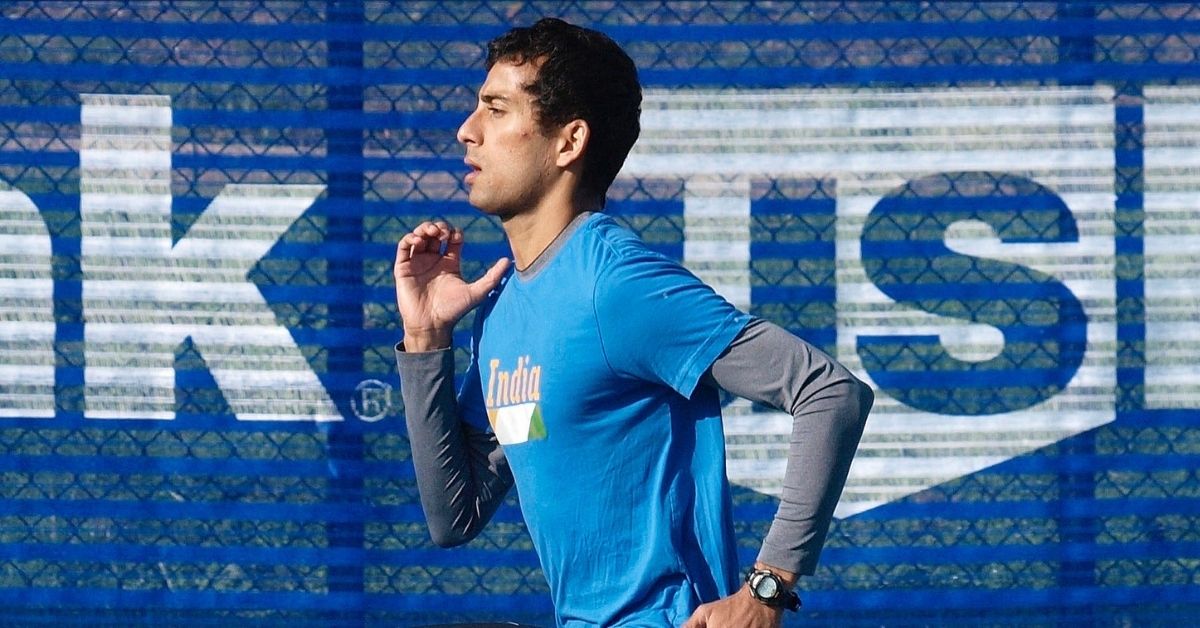
Because Karan had already formed a base in cricket, his athletic training kept getting subsequently harder. “The injuries kept coming back to back. I started too late, the training wasn’t enough, among many other reasons,” he says, adding, “But I never thought of it as a hindrance. Looking back, I realise now that with my injuries, I was never going to make it. But when you’re young, you think nothing can stop you, and I persevered. If I had stopped, the opportunities I got would have never happened,” he says.
Karan’s heartfelt endeavour to mentor and coach talent from the deepest and most unreachable corners of the country comes from the need to provide these kids with a figure he himself lacked at their age. “I just thought about how, when I was younger, if someone like a scout had reached out to direct me towards an athletics programme, I might’ve been somewhere else today,” he says. With this thought in mind, he’s going to great lengths to ensure that the 10 kids under him don’t look back on life with the same question.
For more information, one can visit Coach Karan’s Instagram, as well as that of ITF.
Edited by Yoshita Rao
If you found our stories insightful, informative, or even just enjoyable, we invite you to consider making a voluntary payment to support the work we do at The Better India. Your contribution helps us continue producing quality content that educates, inspires, and drives positive change.
Choose one of the payment options below for your contribution-
By paying for the stories you value, you directly contribute to sustaining our efforts focused on making a difference in the world. Together, let’s ensure that impactful stories continue to be told and shared, enriching lives and communities alike.
Thank you for your support. Here are some frequently asked questions you might find helpful to know why you are contributing?


This story made me
-
97
-
121
-
89
-
167











